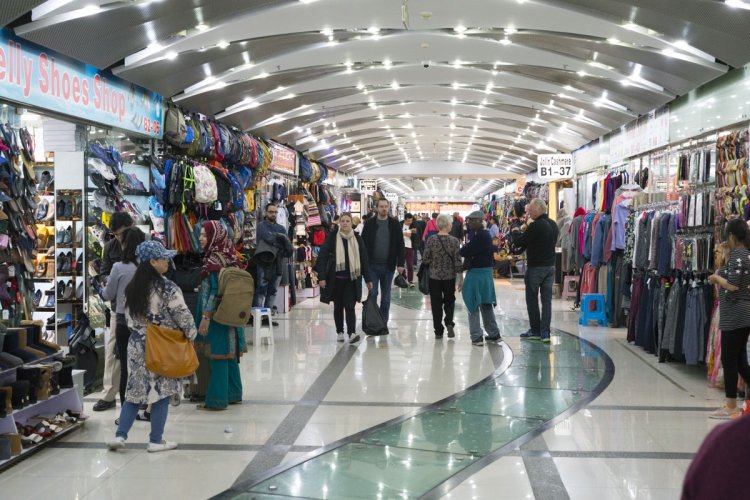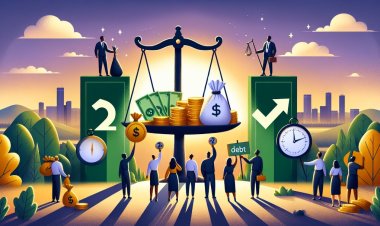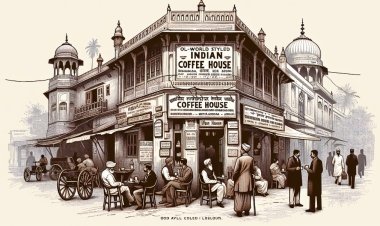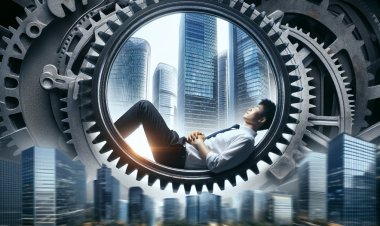No Orders From The US and EU, The World’s Largest Counterfeit Market Is Doomed
Whenever a new product from a well-known or trendy brand is launched on the market, Chinese netizens joke: "Now the pressure is on Yiwu."

No Orders From The US and EU, The World’s Largest Counterfeit Market Is Doomed
Whenever a new product from a well-known or trendy brand is launched on the market, Chinese netizens joke: "Now the pressure is on Yiwu." Yiwu, a county-level city in Zhejiang province, is home to the world's largest wholesale market for small goods and is aptly known as the "capital of small goods"." However, it's also notorious as a hotbed for counterfeit and pirated goods. The term "pressure on Yiwu" means that once a product is a hit in the market, factories in Yiwu quickly replicate it and produce counterfeit goods. These counterfeit products range from cosmetics, clothes, bags, shoes, toys, and sports equipment to daily necessities. How quickly can the market in Yiwu react? If a product becomes a trend or is about to, vendors here can source an identical item within just 5 minutes. If it's not available, they make a mold within a day and produce a sample within two days. This game is all about speed.
If you arrive early, you get the biggest piece; if you arrive late, you get the leftovers. An example: a yoga stick for correcting posture recently became popular. Initially, only one or two sellers offered it, but within a week, it was available at almost every stall. This speed is the strength of the supply chain in Yiwu. Of course, what he portrays as the efficient "supply chain" of Yiwu is actually the production of counterfeit goods. The quality of these counterfeits varies. High-quality imitations, which are difficult to distinguish from the real thing, command a higher price.
Others are obviously counterfeit but remain popular due to their affordability and trendy design. Another common practice is to slightly alter the best-selling products, attach an "international" brand name and logo that resemble the original, and offer them at a fraction of the price of the genuine article. This has become a dominant strategy for many Yiwu merchants. The legacy of Yiwu fakes is notorious. In 2004, CBS aired a segment titled "World's Largest Counterfeit Market,” in which an athletic shoe salesman bragged that he could replicate the latest Nike sneakers in four days for as little as $4 a pair. The segment also mentioned that a $3,000 Callaway golf club can be purchased for just $275. CBS revealed a close relationship between police and counterfeiters and likened the raids to a game of cat and mouse. They quoted Professor Daniel Chow of Ohio State College, a longtime researcher in the field of intellectual property rights infringement: "Local insiders told him that 90% of the goods on the Yiwu market are counterfeit.
Considering that the local trade authority invests in the market and it's an economic pillar that contributes to local tax revenue and administrative fees, it's no surprise that some officials even hold shares." Perhaps this is the cause of the counterfeiting epidemic in Yiwu. The CBS report hasn't stopped counterfeiting activities in Yiwu. In nearly two decades, counterfeiting methods in Yiwu have evolved and modernized. Due to the abundance of counterfeit luxury goods in China, many consumers have turned to purchasing agents abroad. Surprisingly, even these agents can't always escape the counterfeit trap. If you receive a luxury bag that claims to be from Europe or the US, everything from the product and packaging to the receipt and shipping label may be fake. According to Chinese media, the influx of counterfeit luxury goods has led to a booming counterfeit personal shopping industry.
These fake personal shoppers buy high-end counterfeit luxury goods at a fraction of the original price and then sell them at a price only slightly below the original, making huge profits. The modus operandi is to provide fake receipts and falsified shipping details to make it appear that the items are actually from abroad. Reportedly, the growing demand for luxury brands and the associated appeal have encouraged the development of this counterfeiting industry, with Yiwu likely serving as a hub for these operations. Due to strict trademark regulations, such counterfeiting is often covert and not practiced on a large scale. Most products in the commercial city of Yiwu look very similar to luxury goods and bear slightly altered brand logos—a sign of counterfeiting. Of course, in addition to these imitations, there are also many original brand products in Yiwu. Their quality varies, but given their low prices, they have secured a large market share.
A well-known saying goes: "Everything in the world can be found in Yiwu, and often even cheaper." This may be an exaggeration, but it underlines Yiwu's status as the "world capital of goods." Current statistics show that the trading city of Yiwu comprises more than 70,000 stalls, managing 33,127 categories and 1.7 million individual products. The Zhejiang-based online platform Taobao and its parent company Alibaba are famous. A large proportion of the goods on Taobao are sourced from Yiwu. According to reports, this city accounts for no less than 11% of the country's total parcel shipments. In addition to domestic sales, the majority of trade in Yiwu is exported. Many dollar stores around the world source their inexpensive toys and daily necessities from Yiwu. However, like other Chinese trading cities, exporters in Yiwu have noticed a sudden drop in traditional orders from Europe and America this year. In contrast, orders from Africa, Latin America, and countries along China’s Belt and Road Initiative have risen sharply. Data shows that Yiwu's exports to Africa increased by 7% in 2022, accounting for 18.7% of total exports. Between January and July this year, Yiwu's imports and exports to Africa totaled 592 billion yuan, an increase of 31.6%. Trade with Latin America reached 494.2 billion yuan, an increase of 32.7%. In addition, trade with India and Saudi Arabia reached 153.9 billion yuan and 80.6 billion yuan, respectively, growing by 11.3% and 54.6%.
Trade with the Belt and Road partner countries totaled 1196.4 billion yuan, an increase of 18.9%. During this period, exports from Yiwu to Europe and the USA continued to decline. The ongoing Asian Games in Hangzhou, Zhejiang, have further boosted Yiwu's goods production and attracted numerous orders from Southeast Asia, the Middle East, and other Asian countries. It's also interesting to note that Zhejiang is the province where Xi Jinping, the Chairman of the Chinese Communist Party, once served. Recently, Xi Jinping not only attended the opening ceremony of the Asian Games in Hangzhou but also paid a visit to Yiwu. Zhejiang's official media highlighted that during a research visit to Yiwu in 2006, Xi Jinping summarised the city's development experience in twelve characters: "inexplicable"," "created from nothing," and "turning stone into old."
The report cites this "Yiwu development experience," coined by Xi Jinping, as the driving force behind Yiwu's industrial growth. The approach of attracting large enterprises and strengthening existing ones seemed to be a modern legend of Yiwu's "creating from nothing." At first glance, the term "inexplicable" might suggest Xi Jinping's own perplexity towards Yiwu's growth, which is mainly driven by counterfeiting. Terms such as "creating from nothing" and "turning stone into gold" seem to emphasise that Yiwu relies on counterfeiting to accumulate wealth. Could this be Xi Jinping's true opinion? Be that as it may, reliance on such a development model has undoubtedly helped the people of Yiwu prosper quickly. In 2021, the per capita disposable income of urban residents in Yiwu was over 86,000 yuan (around 12,000 US dollars), ranking first in the country, ahead of megacities such as Beijing, Shanghai, Guangzhou, and Shenzhen.
There are also numerous family businesses in Yiwu. The rapid fight against counterfeiting and the rapid market launch in the city can be attributed to this flexible, home-based production model. Most factories in Yiwu are referred to as "three-in-one factories"," housing warehouses, production facilities, and residences. A seemingly ordinary residential house may be a small factory, which many e-commerce entrepreneurs refer to as the primary source of goods, or "source factories." When looking for primary sources in Yiwu, don't just go to the commercial city. Instead, look for these factories that handle everything from production to refining. This is a factory that processes sun-protective clothing. Its scale is surprisingly large. The owner was friendly and told me that they handle both online and offline wholesale. They also offer dropshipping for e-commerce platforms. Here are the finished products to be shipped this afternoon. Over there, the workers are sewing the garments. Because of the high demand for such seasonal products, they're particularly busy now. Here we have a jewellery manufacturing factory.
The colourful trinkets on the assembly table are dazzling. We followed the owner into the sample room, where the jewellery shimmered brilliantly in the glow of the lights. It's hard to imagine that such seemingly upscale jewellery comes from such a humble artisan workshop. Next, we visited a factory that makes socks. The owner told us that he has been in the sock business for 20 years. The workshop is full of machines, suggesting a large operation. Several socks were on display in the sample room. The owner told us that they don't actively sell but only process orders and collect a modest processing fee. Their main clientele consists of long-standing customers. It's quite conceivable that brands such as Nike and Adidas also source their products here! According to reports, a visit to a factory that makes skin-cooling silk masks shows the huge scale of production. Due to the poor air quality in the country, many residents wear masks all year. These “ice silk” masks, known for their smooth and cool texture, are particularly popular in the summer.
However, the cluttered environment, which is typical of family businesses, is a cause for concern. Raw materials and finished products lie haphazardly on the floor, raising doubts about the hygiene standards of such products. Another featured business is a small leather bag workshop, which also has the typical characteristics of a family business. What do you think after watching these videos? Such domestic production models actually benefit from low costs, quick adaptability, and short production cycles. The lack of regulations could be another factor. Perhaps these characteristics are the secret to Yiwu's success. The goods from Yiwu have become very popular, not only in China but also worldwide. This success is largely due to the cheap counterfeiting and dumping of products at extremely low prices. And, not to forget, a lot of cunning tactics and deception. Today, the internet is teeming with videos of Yiwu products being sold by weight.
All these accessories are sold by weight. This whole section has everything like these and these popular ones for girls, in all kinds of colours and styles. Guess what the price is? Only 20 yuan per kilogramme (caption: equivalent to $2.8/500 ams) Let's try it out. 20 yuan per kilogramme; let's see how much we can get. If we start with this 100-chain, which weighs 0.4 kilogrammes, that's still not enough. How much would you normally pay for these strings at an accessory store? If we add more, we get to 0.5 kilogrammes. That's what you get for 20 yuan. How many are there in total? 100, 200... 215 in total. only for 20 yuan, or 2.8 dollars. In addition to accessories, you can also buy toys by weight. The toys in this store cost 18 yuan per kilogramme, or about 2.5 dollars for 500 an. The video shows a range of items, from simple electronic toy cars to modern drones for aerial photography. According to the store owner, many toy stores source their products from him, attracting customers from around the world. However, with such cheap prices, quality assurance remains doubtful. Surprisingly, even water bottles are sold by weight. The seller claims each kilogramme costs 7 yuan, less than $1 for 500 ams. The host weighed one, finding it to be 382 grammes, priced at 5.34 yuan, or approximately 74 cents. Other products sold by weight include clothes, cosmetics, and more. The incredibly low prices of Yiwu's goods are indeed astonishing.
However, some users on Zhihu, a Chinese Q&A platform, have expressed scepticism. They claim that many products sold by weight involve deceptive tactics. Most of these goods are either leftover stock or stored inventory, akin to sale items, with questionable quality. Toys sold by weight in Yiwu have been the source of numerous user complaints. Many internet celebrities might exaggerate their views or might even be sponsored by store owners, leading to potential misrepresentations. One particular broadcaster sheds light on the deceptive practices of selling goods by weight in Yiwu. Despite the general perception of Yiwu's goods being incredibly cheap due to being sold by weight, there's more to the story. In many cases, the products are weighed along with the packaging boxes, and they usually provide large boxes. Eventually, you'll find that for goods worth 1000 yuan, the cardboard box alone accounts for over 100 yuan. In addition, many products sold by weight are remnants that are rarely available in complete sets in all sizes. Defects are common, and it's generally not possible to exchange defective items. When purchasing products, it's therefore important to check the goods thoroughly and even unpack individual items to examine them closely. Yiwu is known as the world's largest wholesale market for small goods and poses a threat not only to Chinese consumers but also to international markets.
Because of the many counterfeit goods, the International Trade City of Yiwu has repeatedly been placed on the U.S. Trade Representative's (USTR) list of notorious markets. Statistics show that China continues to be the main source of counterfeit goods entering the US. In terms of import value, Chinese counterfeits account for an incredible 92%. Counterfeiting and piracy not only harm the intellectual property and economic interests of manufacturers of genuine products but also deceive consumers. The proliferation of this counterfeiting industry is due to the tacit approval and indulgence of the Chinese Communist Party (CCP), with some officials even participating in these activities. Moreover, Chinese laws provide for only light penalties for such fraudulent acts. Typically, offenders are only fined, and after paying, many continue their illegal activities. Such lenient penalties indirectly encourage the counterfeiting industry and entice many to take risks for high profits. Fighting counterfeiting in China is a daunting challenge that resembles an impossible task. The title of "counterfeiting capital," which is attached to Yiwu, could only be shed when the corrupt CCP regime falls.
TradeFxP Features
If you choose to be a self-employed retail trader, here are a few things we offer:
- The best trading platform
- No Requotes
- Lowest Spreads
- High-level liquidity
- Interbank connectivity
- Pure STP/DMA/ECN
- Free signals
- Best support
- Crypto Wallet and withdrawals and deposits (USDT)
- Robust CRM
- TradeFxP wallet
- Once you click withdrawal
- Multiple payment options
- Local offices to walk into
- Free VPS
- Free video chat and virtual meetings
- And many more...
If you choose to be a part of our managed account program,
- All of the above +
- 1-2% Daily Profits
- High-level risk management
- Capital protection
- Only 30% of the capital was used.
- Negative balance protection
- Our fee is from the profits only.
- Monthly profit withdrawal
- Wallet system: use it like PhonePe or Google Pay.
- Crypto wallet and withdrawals/deposits (USDT)
- Live monitoring
- MyFxbook Live Monitoring
- Copy Trading
- And many more...
Optional: If you do not withdraw your profits for 2 months, our system will use those profits to trade and will keep your 100% capital safe and secure for margin purposes. This is optional, and if you choose not to be a part of it, you can withdraw your profits from the first month itself.
Why 1-2% daily? Can't your managed Forex account earn more?
Yes, we can! Remember: greed may be good in the beginning, but in the end, it will destroy everything. You and I know that! Many droplets make an ocean! Join the Managed Account Programme and sit back for six months, then look at your account. You'll see that our strategy is good and the best. Do you know what I mean?
If you choose to be a part of us as an introducing broker (IB) or channel partner,
- Industry-best rebates
- Local office support
- Staff support
- Marketing support
- Marketing materials
- And many more...
Having said that,
You can join our Forex Managed Account program and earn 1-2% profits daily. See for yourself by clicking the below link.
Have a great journey, and may you catch some big waves on your way to prosperity!
To see Ai Forex Trading for real, use these credentials.
- Low-risk strategy:
- Mt4: 112018
- PW: Allah@101
- Server: TradeFxP live,
1. To read why you should be with us, click here.
2. To open an account, click here.
3. To see our regulation certificate, click here.
4. To see our news with the IFMRRC, click here.
5. For claims, click here.
6. For the main site, click here.
7. For blogs and articles, click here.
8. Main Website:www.TradeFxP.com



 admin
admin 










